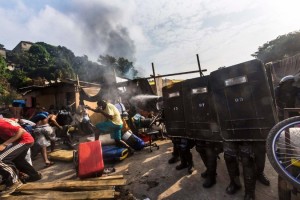Η κρίση αναπαραγωγής της εργατικής τάξης ως “κρίση στέγασης” αυτή τη φορά, με διαφορετική μορφή από την “κρίση μετακίνησης” που αφορούσε σε μεγαλύτερο βαθμό φοιτητικά ή/και μεσαία στρώματα της τάξης στη Βραζιλία, σε συνδυασμό με την συγκυρία του παγκόσμιου κυπέλλου παράγει νέες συγκρούσεις στο δημόσιο χώρο. Οι φαβέλες, οι “πόλεις των φτωχών μέσα στις πόλεις”, η έκφραση της ζωνοποίησης της συσσώρευσης μέσα στο μητροπολιτικό περιβάλλον είναι οι εστίες συγκρούσεων που συμβαίνουν στα σύνορα τους. Η χρηματοπιστωτική μορφή του σύγχρονου καπιταλισμού απαιτεί τη μετατροπή της γης σε ιδιωτικό κεφάλαιο, καθώς η αξία της γης καθορίζεται σε μεγάλο βαθμό από τις προσδοκίες συσσώρευσης στην περιοχή που αξιολογείται. Ταυτόχρονα με την κίνηση του προλεταριάτου να καταλαμβάνει γη για να ζήσει σε εξαθλιωμένες συνθήκες, καθώς αδυνατεί να πληρώσει τα ενοίκια που απαιτεί ακριβώς αυτή η διαδικασία παραγωγής αξίας από τον κατασκευαστικό κλάδο.
Από τον τύπο τους:
RIO DE JANEIRO — Violent clashes broke out on Friday between police officers and squatters here when the authorities dislodged thousands of families from a newly formed favela, or slum, in a complex of abandoned commercial buildings, focusing attention on the rising tension over surging rents and housing shortages.
Just two months before Brazil is to host the World Cup soccer tournament in Rio de Janeiro and other cities, police officers used tear gas and rubber bullets to disperse the squatters at a decaying property in the city’s gritty northern zone owned by Oi, one of the largest telecommunications companies in Brazil.
The squatters fought back by pelting the police with rocks, tossing firebombs and setting buses and police vehicles on fire. Even when officers managed to assert control over the settlement after hours of clashes, the protesters turned to looting nearby banks and a supermarket.
One of the squatters, Nicole Evangelista, 22, said she had put down stakes at the complex just days ago. In a stunning example of how favelas coalesce in Rio, thousands of people had moved to the site this month, coordinating their moves over social media, building wooden shacks and calling their community the Telerj Favela, a nod to the state phone company that used to own the property.

“Five thousand people moved here because they wanted their own home,” said Ms. Evangelista, who is unemployed and came to the settlement from Mandela, another favela in Rio. “But this morning police got here when I was still sleeping,” she said. “An officer told me he was going to fill my head with bullets.”
No deaths were reported in the clashes, but as many as 20 people were injured, including several police officers, according to local media reports. Photographs on the G1 news website showed children suffering from tear gas inhalation. At least 26 people were detained by the police in connection with the clashes and subsequent looting.
Fires from the clashes sent up billows of smoke that could be seen across Rio. Police units also made forays into Jacarezinho and Rato Molhado, two favelas adjacent to the newer squatter settlement, after protesters sought refuge in the mazes of cinder-block houses.
“The operation unfolded as it was planned,” Lt. Col. Cláudio Costa, a spokesman for Rio de Janeiro’s military police, said in televised comments. “We didn’t have problems inside the property, just on the outskirts where there was confrontation.”
Still, the images of the clashes brought into sharp relief the discontent over rising costs of living in Rio as it experiences a frenetic investment surge ahead of the World Cup and the 2016 Summer Olympics, which Rio will also host. Real estate prices and rents have climbed throughout the city, including in many slums, squeezing low-income residents.
At the same time, the construction of affordable housing in Rio has lagged behind. Guilherme Simões, 29, a housing activist working with the squatters, said the Telerj Favela had been occupied because it lay vacant for years. Pointing to the desperation of some of the squatters, he said, “They moved more out of necessity than knowing it would work.”
